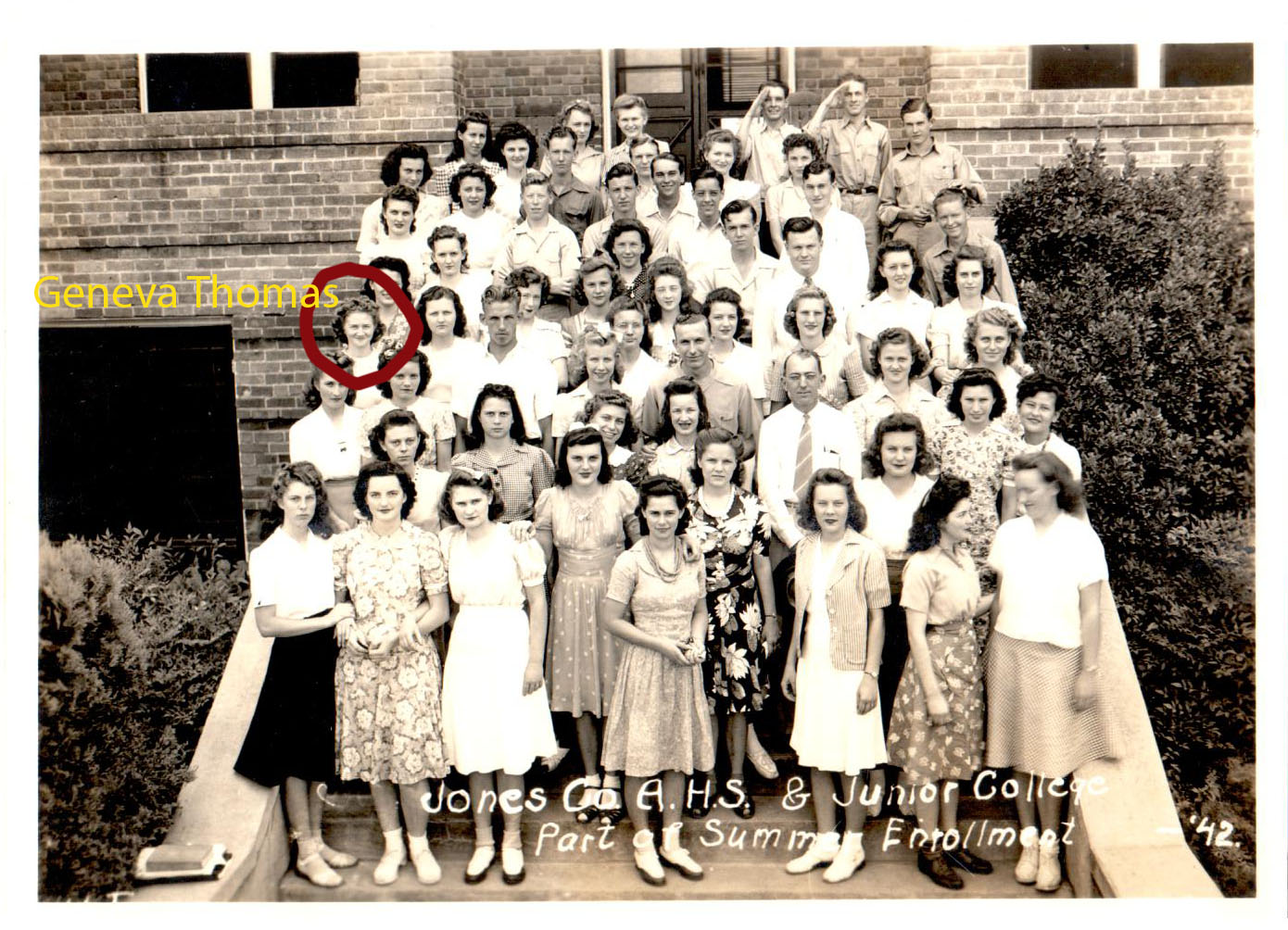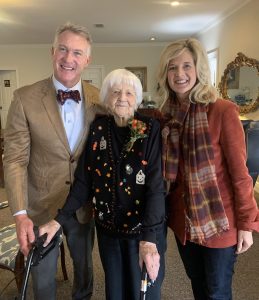
ELLISVILLE – With a birthday on Halloween, 100-year-old Geneva Thomas Burnett naturally had a fun time celebrating her milestone wearing her favorite Halloween themed sweater and sharing memories with Jones College President, Dr. Jesse Smith and his wife, Jennifer. The Smith County native reminisced about her days at Jones College and what it meant to have a birthday on Halloween.
“I didn’t think much of the day, but I have an uncle who said, ‘The witches brought you.’ He was a joker and just trying to get a rise out of me,” said the native of Homewood, a small community in Smith County.
The former educator recently moved from her home in Collins after falling and breaking her hip. Her niece, Cindy Shields said Geneva had lived in her home until just before her 99th birthday, and it was only the second time in her life she had stayed in the hospital for any illness. That’s also the last time she drove her car. Currently residing in an assisted living facility, the former home economics teacher shared how she reached this pinnacle in age, healthy.
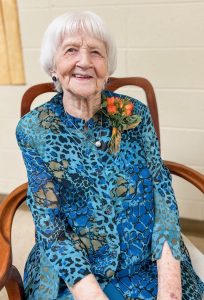 “I didn’t follow any certain diet. I had nutrition courses and we lived on a farm. We ate what we grew, whatever that was. We had three vegetables a day, an orange a day, and limited sweets. I didn’t eat a lot of beef; I ate a lot of fish and chicken and limited the salt,” said Burnett. “I also drank black coffee before breakfast, no sugar or cream.”
“I didn’t follow any certain diet. I had nutrition courses and we lived on a farm. We ate what we grew, whatever that was. We had three vegetables a day, an orange a day, and limited sweets. I didn’t eat a lot of beef; I ate a lot of fish and chicken and limited the salt,” said Burnett. “I also drank black coffee before breakfast, no sugar or cream.”
Her family also didn’t have electricity until her senior year in high school in 1940 and they never had air conditioning. They lived like pioneers, she laughed. Geneva rode five miles on the school bus to get to high school which consisted of only eight classmates: five girls and three boys. As the valedictorian of her small class in the Homewood schoolhouse, she headed off to Jones County Junior College during the summer planting season.
“I started in the summer instead of waiting until September, then I went three quarters in the winter, and I went the next summer-five quarters instead of six. Each quarter I took the recommended load plus one class which meant I could graduate in five quarters instead of six!” Burnett said proudly.
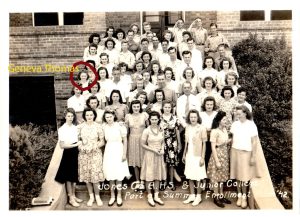 Looking at her 1942 summer school class picture at JCJC, she pointed out there were not many boys in school because of the war. She shared, only one of the three boys in her high school senior class survived. After prodding from her niece, Burnett shared she never had a serious boyfriend at JCJC.
Looking at her 1942 summer school class picture at JCJC, she pointed out there were not many boys in school because of the war. She shared, only one of the three boys in her high school senior class survived. After prodding from her niece, Burnett shared she never had a serious boyfriend at JCJC.
“When WWII started, he left and that was the end of it. It wasn’t a serious relationship for him, and I wasn’t worried about that at the time. My classes were a priority because I was determined. I did a lot of extra things; I worked waiting tables in the dining hall and other activities that took time from the evening. The lights were out at 10 p.m. for curfew,” explained Burnett.
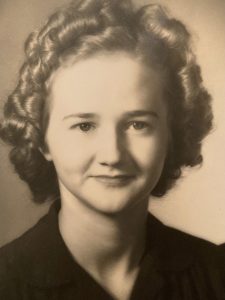
Her favorite teacher at Jones was Miss Corley who taught English. Corley, who lived in Raleigh, took Geneva “under her wings” and invited her to be a part of a club she sponsored. Growing up, Geneva’s mother, Beulah Anderson Thomas, wanted to be a schoolteacher but since she couldn’t follow her dream, she ingrained the idea in Burnett and her two sisters, Laura Louise, and Iva Nell, and eventually to all of her relatives. Ironically, teaching elementary aged students is how Geneva was able to pay tuition at Mississippi Southern College (the University of Southern Mississippi). Burnett earned her Bachelor of Science Degree in Home Economics Education in 1946 and her master’s degree in textiles and clothing at the University of Tennessee in 1952.
“Once I got my master’s degree, I had a graduate assistantship in charge of a research project. I ended up staying six years as a faculty member. Doing the research, I didn’t feel like I had the background to really do it justice so when I had the chance to come to Southern to teach, I left,” Burnett said.
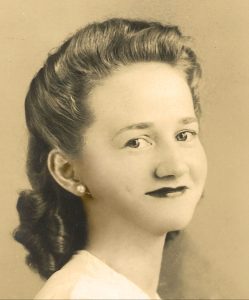
Before she could leave Tennessee, the bank that loaned her $1,200 for her first car, a 1957 Chevrolet, made sure she paid her loan off in full.
“Most places I lived where I could walk to work. I saved up $1,200 for my first car after working at U.T. doing research after I graduated. I got a loan for the other half. As I was preparing to leave for Hattiesburg, Mississippi to take the job at Mississippi Southern College, I inquired with the bank about how much I owed. However, they were not going to let me leave Knoxville until I paid off the loan, which I did with the little savings I had left.”
Confident in her teaching skills at Southern, Burnett’s students seemed to thrive as she helped them develop critical thinking skills as they worked on each garment. However, after two years of teaching, Geneva met her future husband who had been teaching in the business department for someone on sabbatical.
“Bill wanted to go to New York University to earn his Ph.D. since he had earned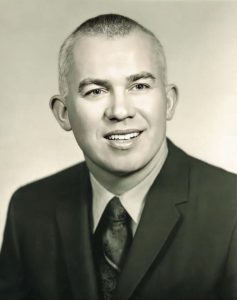 his master’s degree there. We got married that summer in 1960. He had some savings and investments, but it wasn’t enough for two people to live on for two-three years while he earned his degree. It was important for me to have a job, so I applied everywhere in New York,”
his master’s degree there. We got married that summer in 1960. He had some savings and investments, but it wasn’t enough for two people to live on for two-three years while he earned his degree. It was important for me to have a job, so I applied everywhere in New York,”
To her surprise, Sears offered her a textile testing position and she worked for them for two-and-a-half years. After her husband quit school and was employed on Wall Street, Burnett pursued a better job. Answering an ad in the New York Times, Geneva got the job as the Director of Quality Control for the Fruit of the Loom company.
“I’d take the samples of what they sold under the Fruit of the Loom label and shop the market and find comparable merchandise at a comparable price and test it to see how it stood up against the competition. I would get the results from the lab in New York City and write up my report and share the information with the business representatives,” said Burnett, who worked there for seven years.
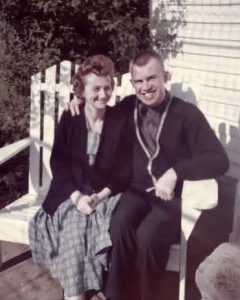 As the tumultuous 1970s rocked the financial world, her husband lost his job and the couple moved to Oil City, Pennsylvania, a booming oil industry town. Taking a job as a trust investment officer at a bank meant Geneva didn’t have to work. However, she explains, she got “roped into” joining the federated women’s club, Belle Lettres Club and did a lot of community service work.
As the tumultuous 1970s rocked the financial world, her husband lost his job and the couple moved to Oil City, Pennsylvania, a booming oil industry town. Taking a job as a trust investment officer at a bank meant Geneva didn’t have to work. However, she explains, she got “roped into” joining the federated women’s club, Belle Lettres Club and did a lot of community service work.
“These ladies had a lot of ‘old’ money from the oil industry; they had nice houses, and they had all the help they needed to maintain the house. In 1888, when the club began, they decided they wanted to study literature, so they organized the club at one of the members’ houses, who eventually donated their residence to become the club house. People I got acquainted with at the bank invited me to attend and I joined soon after. Right away, they wanted me to do this job and that,” shared Burnett.
She served as 2nd VP of Programs, 1st VP of Membership, and President, while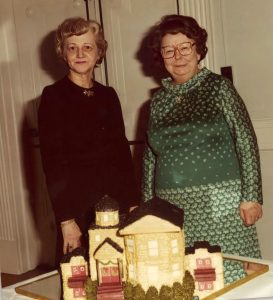 also pulling off a very successful fundraising campaign to refurbish and remodel the “club house.”
also pulling off a very successful fundraising campaign to refurbish and remodel the “club house.”
In 1978, her husband Bill was diagnosed with Multiple Myeloma. He worked part time until April of 1978, when he decided to come home, dying five months later. After getting her business affairs in order in Pennsylvania, Geneva packed up and moved to be near her sisters in Clinton, Mississippi.
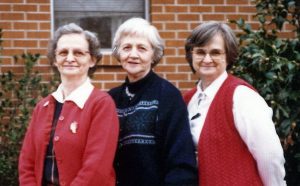 “Both of my sisters went to JCJC. Laura Louise Thomas taught 9th grade English at Laurel for a long time and Iva Nell Thomas Fortenberry taught high school science in Monticello for most of her career. Mom wanted all of us to be teachers,” said Burnett.
“Both of my sisters went to JCJC. Laura Louise Thomas taught 9th grade English at Laurel for a long time and Iva Nell Thomas Fortenberry taught high school science in Monticello for most of her career. Mom wanted all of us to be teachers,” said Burnett.
The “take care of business” lady, continued to actively involve herself as a member of the First United Methodist Church, taking on various leadership roles in the First United Methodist Women’s group. On a regional level, Burnett served as the treasurer for the West Jackson-Vicksburg District and was on the Arlean Hall Administrative Board for eight years.
When asked if she had any advice for today’s students she politely deferred to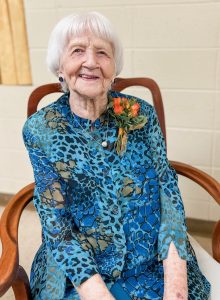 comment.
comment.
“I wouldn’t know what to say! I have no advice because everything is so different,” said Geneva. However, her niece reminded her of how she solved daily problems. “I had ups and downs. I dealt with them,” said Burnett. “For some reason I never felt like I didn’t have a solution.”
Geneva also never expected anyone to take care of her and she didn’t get more in debt than she could handle. Living frugally and keeping to the basics, like her parents taught her, Geneva thinks helped her to reach 100 years of age.

